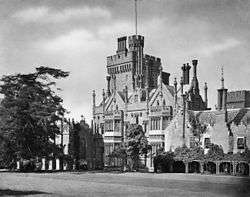John Chessell Buckler
| J.C. Buckler | |
|---|---|
| Born | 8 December 1793 |
| Died | 10 January 1894 (aged 100) |
| Nationality | British |
| Occupation | Architect |
John Chessell Buckler (8 December 1793 – 10 January 1894) was a British architect, the eldest son of the architect John Buckler. J.C. Buckler initially worked with his father before taking over his practice. His work included restorations of country houses and at the University of Oxford.
Career

Buckler received art lessons from the painter Francis Nicholson. From 1810 onwards he worked with his father. His younger brother, George, later joined them and reported that the three worked "in perfect harmony". In 1830 his father handed over his architectural practice to him, and he worked in partnership with George until 1842.[1]
In 1825 Buckler began rebuilding Costessey Hall, Norfolk, for Lord Stafford. His work there was described by Charles Locke Eastlake, writing in 1872, as "one of the most important and successful instances of the [Gothic] Revival in Domestic Architecture". It was in a "Tudor" style, in red and white brick, with stone dressings. The new buildings formed an irregular picturesque group, with stepped gables, angle turrets and richly moulded chimney-shafts, exhibiting, according to Eastlake " a knowledge of detail and proportion far in advance of contemporary work".[2]
Buckler did a lot of work in Oxford, carrying out repairs and additions to St. Mary's Church, and Oriel, Brasenose, Magdalen, and Jesus Colleges. He also restored Oxburgh Hall, Norfolk, and Hengrave Hall, Suffolk, and designed Dunston Hall, Norfolk, and Butleigh Court in Somerset.[2]
In 1836 he came second, behind Charles Barry, in the competition to rebuild the Palace of Westminster following its destruction by fire.[3]
Buckler's writings included the text accompanying his father's engravings of Views of the Cathedral Churches of England and Wales (1822). In 1823 he published Observations on the Original Architecture of St. Mary Magdalen College, Oxford, in which he expressed his hostility towards changes in the quadrangle of Magdalen College. Some of his later writings, such as A History of the Architecture of the Abbey Church of St Alban (1847), were in collaboration with his own son, Charles Alban Buckler.[1]
He retired in 1860,[1] and died, aged 100, on 10 January 1894.[1]
Works
Buildings that he designed or restored include:
- Costessey Hall, Norfolk, 1826
- St. Mary's parish church, Adderbury, Oxfordshire: restoration of chancel, 1831–34[4]
- St. Nicholas' parish church, Old Shoreham, West Sussex: restoration of chancel, 1839–40[5]
- Butleigh Court, Somerset, 1845
- Church Of St Leonard, Butleigh, Somerset.[6]
- schoolroom at Magdalen College, Oxford, 1849–51 (now a library)[7]
- St. Mary's parish church, Steeple Barton, Oxfordshire: rebuilding, 1850[8]
- St. Mary the Virgin parish church, Lower Swell, Gloucestershire: rebuilt nave, 1852[9]
- St. Mary's parish church, Pyrton, Oxfordshire: rebuilding, 1856[10]
- Dunston Hall, Norfolk, 1859 onwards
- Lincoln Cathedral
- Oxburgh Hall, Norfolk
Buckler's restorations at the University of Oxford include:
See also
Unbuilt Proposals
Kilronan Castle, Keadue, Co. Roscommon, Ireland.
References
- 1 2 3 4 5 Tyack, 2004
- 1 2 Eastlake, Charles Locke (1872). A History of the Gothic Revival. London: Longmans, Green & Co. pp. 110–11.
- ↑ "Miscellaneous Notices respecting the new competition designs for the New Houses of Parliament". Architectural Magazine. 3: 104. 1836. Retrieved 10 September 2011.
- ↑ Sherwood & Pevsner, 1974, pages 413–414
- ↑ Nairn, 1965, page 287
- ↑ "Church of St John The Baptist". Historic England. Retrieved 31 October 2015.
- ↑ Sherwood & Pevsner, 1974, page 155
- ↑ Sherwood & Pevsner, 1974, page 788
- ↑ Verey, 1970, page 442
- ↑ Sherwood & Pevsner, 1974, page 732
- ↑ Sherwood & Pevsner, 1974, page 283 and footnote
Sources
- Nairn, Ian; Pevsner, Nikolaus (1965). Sussex. The Buildings of England. Harmondsworth: Penguin Books. p. 287. ISBN 0-14-071028-0.
- Sherwood, Jennifer; Pevsner, Nikolaus (1974). Oxfordshire. The Buildings of England. Harmondsworth: Penguin Books. ISBN 0-14-071045-0.
- Tyack, Geoffrey (2004). "Buckler, John (1770–1851)". Oxford Dictionary of National Biography. Oxford University Press. Retrieved 23 June 2009. (subscription required (help)).
- Verey, David (1970). Gloucestershire: The Cotswolds. The Buildings of England. 1. Harmondsworth: Penguin Books. p. 442. ISBN 0-14-071040-X.